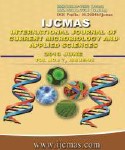


 National Academy of Agricultural Sciences (NAAS)
National Academy of Agricultural Sciences (NAAS)

|
PRINT ISSN : 2319-7692
Online ISSN : 2319-7706 Issues : 12 per year Publisher : Excellent Publishers Email : editorijcmas@gmail.com / submit@ijcmas.com Editor-in-chief: Dr.M.Prakash Index Copernicus ICV 2018: 95.39 NAAS RATING 2020: 5.38 |
Neonatal sepsis is one of the major causes of morbidity and mortality in the newborn. The most common isolates in the early onset septicemia are Klebsiella Spp. Bacterial isolates and their antibiotic susceptibility has been constantly changing. Thus the aim of the study was to isolate the aerobic bacteria responsible for early onset neonatal septicemia and determination of their antibiotic sensitivity pattern. The present study was conducted in department of microbiology of a tertiary care hospital. Blood sample were collected from 268 clinically suspected cases of neonatal septicemia admitted in the neonatal intensive care unit. About 1ml of blood was inoculated into 10ml of brain heart infusion (BHI) broth and incubates for 7 days. Repeated sub-culturing was done as per standard procedures. Any growth was subjected for identification by appropriate biochemical tests. Antibiotic susceptibility testing was done. Out of 83 culture positive cases, early onset septicemia was seen in 75(90.4%) cases. Gram negative organisms (63%) were predominant than Gram positive organisms (36%). Klebsiella pneumoniae (43%) and Coagulase Negative Staphylococcus (36%) were the common organisms isolated. Gram negative bacteria were resistant to routinely used antibiotics and were highly sensitive to Imipenem (100%). The Gram positive bacteria showed high resistance to Ampicilin (90%). Gram negative organisms mainly Klebsiella pneumoniae were most common agents causing early onset neonatal sepsis, their resistance pattern should be considered essential for deciding the empirical treatment.
 |
 |
 |
 |
 |